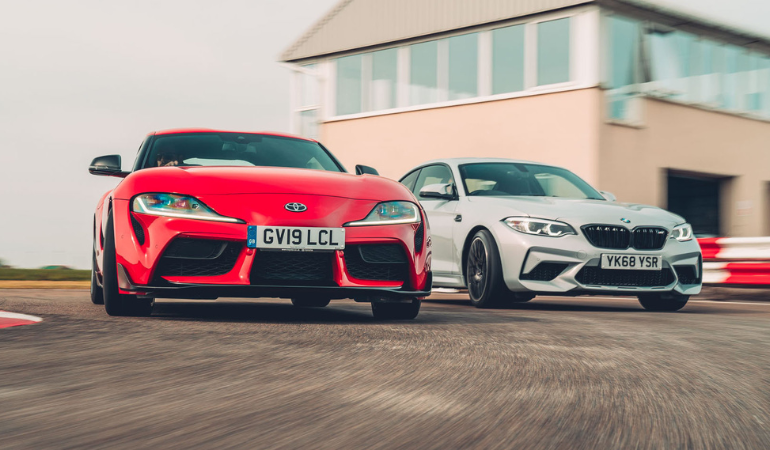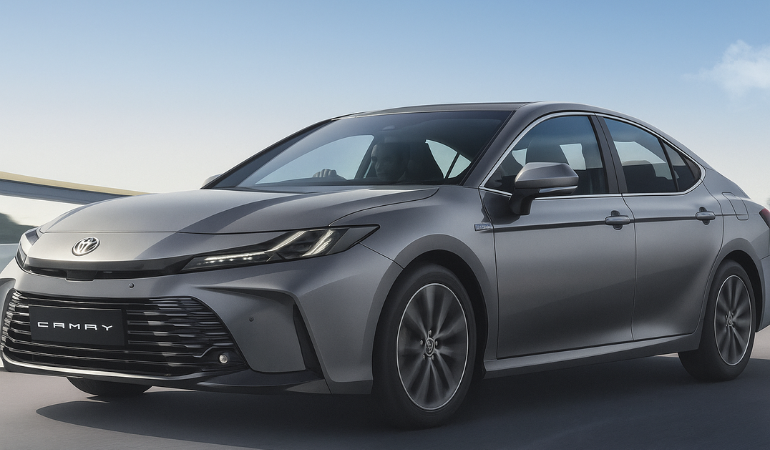Now Reading: Toyota vs BMW: Which Brand Truly Delivers the Ultimate Driving Experience?
-
01
Toyota vs BMW: Which Brand Truly Delivers the Ultimate Driving Experience?
Toyota vs BMW: Which Brand Truly Delivers the Ultimate Driving Experience?

When it comes to choosing between Toyota and BMW, drivers face a classic dilemma — reliability versus performance, affordability versus luxury. Both brands dominate their respective spaces, but they cater to entirely different types of customers. Let’s explore how these automotive titans stack up in every category that matters.
Overview of Toyota and BMW
Toyota – The Epitome of Reliability and Affordability
Founded in 1937, Toyota has built its reputation on dependability, efficiency, and practicality. Known for vehicles that last decades, Toyota emphasizes quality and long-term value. Its models like the Camry, Corolla, and RAV4 have consistently topped sales charts globally.
BMW – The Symbol of Performance and Prestige
BMW, founded in 1916, stands as a hallmark of German engineering. Its tagline, “The Ultimate Driving Machine,” perfectly captures the brand’s focus on dynamic performance, precision, and luxury. Models like the BMW 3 Series, X5, and M lineup are engineered for those who value thrill and sophistication.
The Cheapest new car 2024 is built to offer affordable, no-frills transportation. It typically has a small petrol engine (often under 1.2 litres), manual transmission, and modest power—enough for city driving but not for spirited acceleration. The interior is simple: hard plastics, basic upholstery, minimal infotainment (perhaps a small radio or simple screen), manual windows and mirrors. Safety features are pared down—driver airbag, ABS, maybe passenger airbag; advanced driver aids are unlikely. Comfort is minimal, with limited sound insulation, basic seating, and small boot space. Its advantages are low purchase price, excellent fuel efficiency, reduced maintenance cost, and ease of parking in tight city spaces. The trade-offs are less comfort, fewer features, lower performance, and potentially less resale value.
Brand Philosophy and Identity
Toyota’s “Kaizen” Approach
Toyota operates on the principle of Kaizen, meaning continuous improvement. Every model evolves with subtle but impactful upgrades in design, performance, and technology. This philosophy ensures reliability and consistency across generations.
BMW’s “Ultimate Driving Machine” Ethos
BMW builds cars for enthusiasts. From steering precision to power delivery, every BMW promises an emotional connection with the road. The brand focuses on performance-first engineering, ensuring every drive feels special.
Design and Aesthetics
Toyota’s Functional and Subtle Design
Toyota’s design language emphasizes simplicity, functionality, and broad appeal. While not overly flashy, cars like the Camry and Highlander showcase elegance and durability, making them perfect for daily use and family needs.
BMW’s Bold and Sporty Appeal
BMW’s design is more aggressive and performance-oriented. The signature kidney grille, muscular body lines, and aerodynamic shapes give every BMW an unmistakable identity — one that screams luxury and sportiness.
Performance Comparison
Engine and Powertrain
BMW excels in engine performance, offering turbocharged and high-output engines across its lineup. Models like the M3 or M5 deliver unmatched power and speed. Toyota, while less aggressive, provides dependable powertrains with excellent balance between efficiency and capability.
Handling and Driving Dynamics
When it comes to handling, BMW takes the crown. Its precise steering, rear-wheel-drive setup, and balanced chassis offer a truly engaging driving experience. Toyota focuses more on comfort and stability, making its cars ideal for everyday driving.
Reliability and Maintenance
Toyota’s Legendary Dependability
Toyota vehicles are known to run for hundreds of thousands of miles with minimal issues. Maintenance costs are low, parts are affordable, and resale value remains high — a combination that cements Toyota’s reputation for reliability.
BMW’s Complex Engineering and Cost
BMW’s high-performance engineering comes with higher maintenance costs. While reliable for a luxury brand, BMWs often require specialized service and parts, leading to a steeper long-term expense compared to Toyota.
Technology and Innovation
Toyota’s Hybrid Leadership
Toyota revolutionized the automotive industry with the Prius, leading the hybrid movement. Its hybrid technology now spans across the entire lineup, including SUVs and sedans, offering fuel efficiency without compromising performance.
BMW’s Cutting-Edge Tech and Connectivity
BMW integrates technology that enhances both comfort and control. Features like iDrive, gesture control, and advanced driver-assist systems highlight BMW’s tech-forward approach to luxury driving.
Safety Features
Toyota Safety Sense (TSS)
Every new Toyota comes equipped with the Toyota Safety Sense suite, including adaptive cruise control, lane departure warning, and pre-collision systems — all standard, not optional.
BMW Active Driving Assistant
BMW’s Active Driving Assistant provides adaptive cruise, lane-keeping assistance, and collision mitigation, but these features often come as part of higher trim levels or optional packages.
Comfort and Interior Quality
Toyota’s Practical Interiors
Toyota interiors prioritize comfort, simplicity, and function. Soft-touch materials, intuitive controls, and spacious cabins make Toyotas a joy for daily commuting.
BMW’s Luxurious Cabin Craftsmanship
BMW interiors are a blend of luxury and sport. From high-quality leather upholstery to ambient lighting and ergonomic design, the cabin feels premium in every detail.
Fuel Efficiency and Sustainability
Toyota’s Eco-Friendly Hybrids
Toyota’s hybrid technology leads the industry, offering unmatched fuel efficiency. Models like the Corolla Hybrid and Prius deliver exceptional mileage and reduced emissions.
BMW’s Efficient Dynamics and Electric Push
BMW’s Efficient Dynamics program improves performance while reducing fuel consumption. Its electric division, BMW i, continues to innovate with models like the i4 and iX, bringing sustainability to luxury.
Cost of Ownership
Purchase Price and Value Retention
Toyota vehicles generally have a lower purchase price and higher resale value. BMWs, though premium, tend to depreciate faster due to higher initial costs and maintenance needs.
Maintenance, Repairs, and Insurance
Toyota’s maintenance costs are minimal, making ownership hassle-free. BMW, being a luxury brand, involves higher service costs and insurance premiums — a trade-off for luxury performance.
Popular Models Comparison
Toyota Camry vs BMW 3 Series
The Camry wins in reliability and value, while the 3 Series dominates in driving excitement and luxury feel. Your choice depends on whether you prioritize longevity or thrill.
Toyota RAV4 vs BMW X3
The RAV4 shines with practicality, hybrid options, and affordability. The X3 delivers superior performance and refinement but at a premium price point.
Global Market and Brand Reputation
Toyota’s Global Dominance
Toyota consistently ranks among the top automakers worldwide, appealing to mass markets with its reliability and value-driven approach.
BMW’s Premium Market Focus
BMW targets the upper-tier segment, focusing on brand prestige and performance. It may not sell as many cars as Toyota, but it leads in the luxury category.
Which One Should You Choose?
For Reliability and Budget-Conscious Buyers
Choose Toyota if you want a vehicle that’s dependable, fuel-efficient, and affordable to maintain. It’s perfect for families and long-term owners.
For Enthusiasts and Luxury Seekers
Go with BMW if performance, style, and luxury are your priorities. Every drive feels special — but expect to pay more for the experience.
Conclusion: The Final Verdict
In the Toyota vs BMW debate, there’s no clear winner — just two brands excelling in their own domains. Toyota delivers unbeatable reliability, while BMW provides unmatched performance and prestige. The right choice depends entirely on what kind of driver you are.
FAQs
1. Which is more reliable, Toyota or BMW?
Toyota is more reliable and offers lower maintenance costs over time.
2. Are BMWs worth the higher price?
Yes, if you value performance, luxury, and technology — BMWs justify their premium.
3. Which brand has better resale value?
Toyota typically has a stronger resale value due to its dependability.
4. Is BMW more fun to drive than Toyota?
Absolutely. BMWs are engineered for performance, providing a sportier and more engaging drive.
5. Which is better for long-term ownership?
Toyota is the better long-term investment due to lower upkeep and proven durability.













